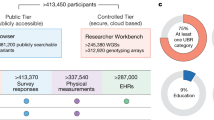Abstract
Genetic studies in humans provide a method to test hypotheses about the biological roles of specific genes. So far, ten published papers have chosen to examine the hypothesis that uncoupling protein-2 (UCP2) and/or UCP3 influence energy expenditure and/or body fat accumulation. These genes were chosen because they are candidate energy expenditure genes, based on their homology to UCP1. Studies of UCP2 and UCP3 are intrinsically intertwined because the two genes are separated by only 6000 base pairs on human chromosome 11. Linkage studies in families have suggested that UCP2 and/or UCP3, or a closely linked gene, may influence resting metabolic rate (RMR) Some association studies using a 3′ untranslated region insertion/deletion variant of UCP2 have produced statistically positive evidence for association with body mass index (BMI) and RMR. In contrast, association studies of UCP2 using an Ala to Val variant at amino acid 55 have produced negative results. Positive results have also been reported for association of a UCP3 splice variant with respiratory quotient in African Americans. In addition, no studies have reported linkage or association of UCP2 or UCP3 with diabetes. Overall, the results suggest that some variants of UCP2 and UCP3 may be associated with obesity traits in some populations. The UCPs, to date, show positive results in associations with obesity traits but not with diabetes traits. Further work will be needed to settle the role of UCP2 and UCP3 alleles in human body weight regulation.
This is a preview of subscription content, access via your institution
Access options
Subscribe to this journal
Receive 12 print issues and online access
$259.00 per year
only $21.58 per issue
Buy this article
- Purchase on Springer Link
- Instant access to full article PDF
Prices may be subject to local taxes which are calculated during checkout
Similar content being viewed by others
Author information
Authors and Affiliations
Corresponding author
Rights and permissions
About this article
Cite this article
Warden, C., Warden, D. Genetics of uncoupling proteins in humans. Int J Obes 23 (Suppl 6), S46–S49 (1999). https://doi.org/10.1038/sj.ijo.0800944
Published:
Issue Date:
DOI: https://doi.org/10.1038/sj.ijo.0800944
Keywords
This article is cited by
-
Activities of cytochrome c oxidase and citrate synthase in lymphocytes of obese and normal-weight subjects
International Journal of Obesity (2002)
-
Genetic variation at the uncoupling protein 1, 2 and 3 loci and the response to long-term overfeeding
European Journal of Clinical Nutrition (2001)
-
UCP2 muscle gene transfer modifies mitochondrial membrane potential
International Journal of Obesity (2001)



